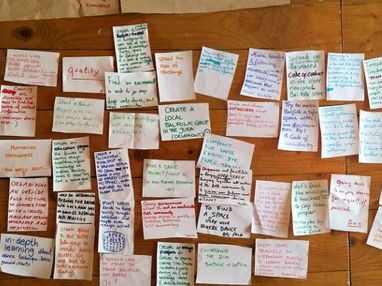From creative mandala to statistical questionnaire
The association Les Coccinelles has been running international youth projects for many years. They focus on personal development, sustainability and inclusion. The principles of non-formal education, such as voluntary, low-threshold and needs-oriented learning, are particularly important to them. The “SustainaBal” project focuses on intercultural exchange on the subject of folk dance and music. For one week, 25 young people from Germany, Italy, Latvia, the Netherlands and Switzerland met in the Jura and spent time learning dance, effective cooperation and intercultural communication together.

The planning of the programme and the evaluation of the achievement of objectives are based on the key competencies of the European Lifelong Learning Programme. In concrete terms, this means that the different activities of the project are based on these competencies, so that the young people and the accompanying persons can develop their competencies in these areas during the project. The evaluation accordingly examines to what extent this has been achieved. Various methods are implemented at the beginning, during and after the project.
At the beginning of the project, the participants, together with the group leaders of Les Coccinelles, define their expectations and wishes regarding the learning experience. The needs and the social and professional competencies on which they want to focus during the exchange are recorded in the form of a poster. The group leaders may, if necessary, make changes to the programme in order to meet the needs as best possible. The poster can constantly be used as a reference during the programme.


The participants record their personal learning experiences during the programme in a learning diary every day. For this purpose, they create their own personal “Mandala of Learning”. This self-reflection supports the learning process by making the participants aware of their development. This creates the link between the different competencies (e.g. social skills or communication skills such as active listening and non-verbal communication, as well as creativity and teamwork) and the experiences of the day.
Progress is discussed every day in the “Morning Circle”, a joint feedback session. This includes a check to see whether the needs of the participants still apply and are still being covered by the programme. This may also result in changes to the programme.
At the end of the project, both individual and group meetings are held with the project leaders to evaluate the various project activities. A questionnaire is used for this purpose.
Another questionnaire is sent out to participants several weeks after the end of the project. It aims to find out how they can apply and use the skills and competencies they have learned in their life and work.
The various evaluation and reflection methods of Les Coccinelles are convincingly planned and implemented, and show how international youth projects can be evaluated in a well-founded way, thereby strengthening the learning process as well as the impact. These are essential elements and should be part of any good exchange or mobility project.